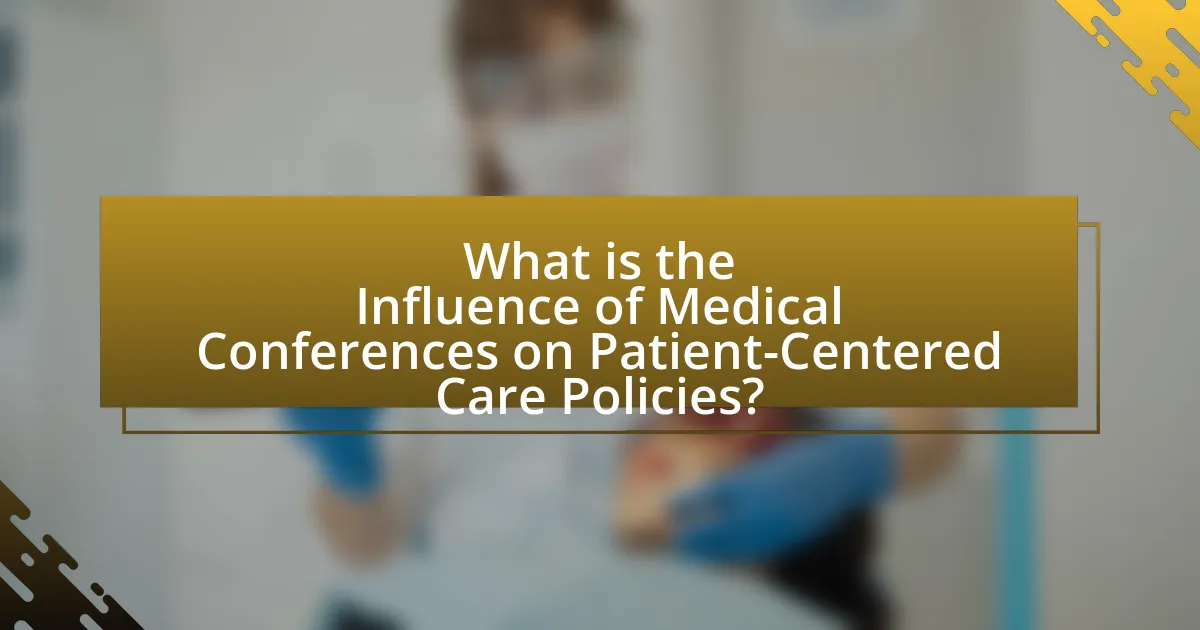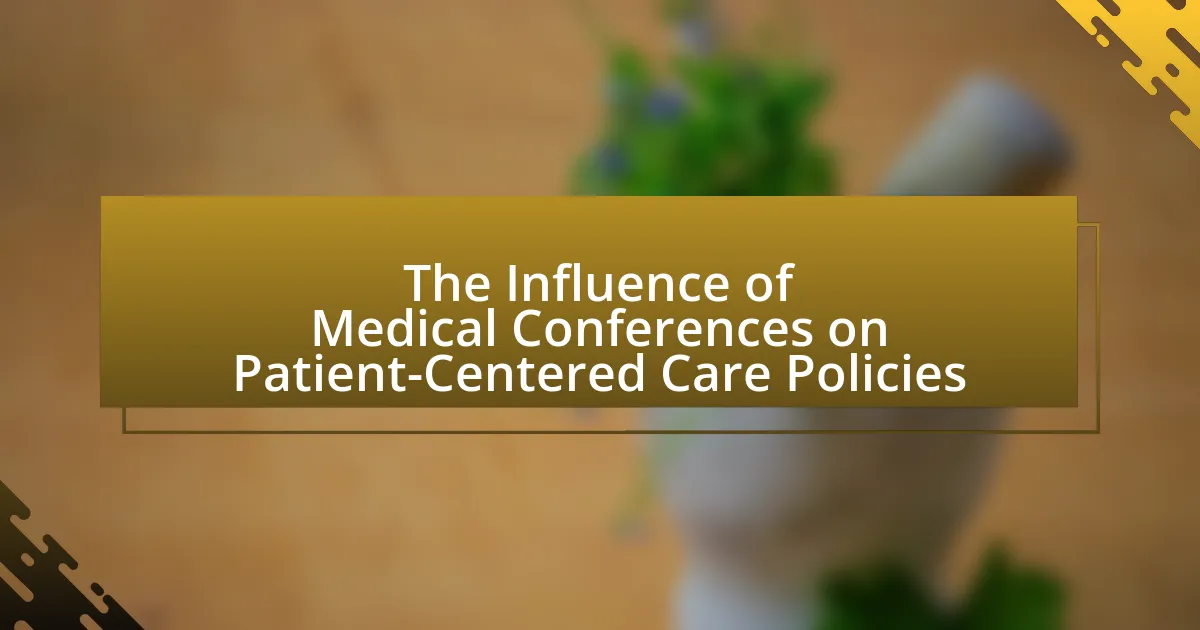Medical conferences play a crucial role in shaping patient-centered care policies by facilitating the exchange of innovative ideas, research findings, and best practices among healthcare professionals. These events serve as platforms for discussing emerging trends and successful case studies that prioritize patient engagement and outcomes. Key components such as expert presentations, networking opportunities, and policy discussions contribute to the development of actionable healthcare policies. However, challenges such as funding biases and the disconnect between conference content and real-world application can hinder the effective translation of insights into practice. Overall, medical conferences significantly influence the evolution of patient-centered care policies by fostering collaboration and knowledge sharing among diverse stakeholders.

What is the Influence of Medical Conferences on Patient-Centered Care Policies?
Medical conferences significantly influence patient-centered care policies by facilitating the exchange of innovative ideas and best practices among healthcare professionals. These conferences serve as platforms for presenting research findings, discussing emerging trends, and sharing successful case studies that prioritize patient engagement and outcomes. For instance, the annual meeting of the American Medical Association often highlights advancements in shared decision-making and personalized treatment approaches, which directly inform policy development. Additionally, studies have shown that participation in such conferences correlates with improved adherence to patient-centered care principles, as healthcare providers gain insights into effective communication strategies and patient involvement techniques. This exchange of knowledge ultimately shapes the guidelines and frameworks that govern patient care practices.
How do medical conferences shape healthcare policies?
Medical conferences shape healthcare policies by facilitating the exchange of knowledge, research findings, and best practices among healthcare professionals and policymakers. These events serve as platforms for discussing emerging trends, innovations, and evidence-based practices that can influence policy decisions. For instance, the American Medical Association’s annual meeting often leads to the adoption of new guidelines and recommendations that directly impact healthcare delivery. Additionally, conferences provide opportunities for networking, allowing stakeholders to collaborate on policy initiatives, thereby ensuring that healthcare policies are informed by the latest scientific evidence and clinical experiences.
What are the key components of medical conferences that impact policy?
The key components of medical conferences that impact policy include expert presentations, networking opportunities, and policy discussions. Expert presentations provide the latest research findings and clinical practices, which inform policymakers about evidence-based approaches. Networking opportunities facilitate collaboration among healthcare professionals, researchers, and policymakers, fostering relationships that can lead to policy advocacy. Policy discussions at these conferences allow stakeholders to address current challenges and propose actionable solutions, thereby influencing the development and implementation of patient-centered care policies. For instance, the American Medical Association’s annual meeting often results in resolutions that shape healthcare policy based on insights shared during these events.
How do discussions at medical conferences translate into policy changes?
Discussions at medical conferences translate into policy changes through the dissemination of new research findings, expert consensus, and collaborative networking among healthcare professionals and policymakers. These conferences serve as platforms where emerging evidence and innovative practices are shared, leading to informed decision-making. For instance, the American College of Cardiology’s annual meeting has historically influenced cardiovascular guidelines by presenting pivotal studies that shape clinical practice recommendations. Additionally, the interactions and collaborations fostered at these events often result in the formation of task forces or committees that advocate for specific policy adjustments based on the latest scientific insights.
Why are medical conferences important for patient-centered care?
Medical conferences are important for patient-centered care because they facilitate the exchange of knowledge and best practices among healthcare professionals. These events provide a platform for discussing the latest research, innovations, and treatment methodologies that prioritize patient needs and preferences. For instance, studies have shown that participation in medical conferences can lead to improved clinical outcomes, as healthcare providers implement new strategies learned from peers. Additionally, conferences often feature patient advocates, ensuring that the voices of patients are included in discussions about care policies and practices, which further enhances the focus on patient-centered approaches.
What role do stakeholders play in these conferences?
Stakeholders play a crucial role in medical conferences by influencing the development and implementation of patient-centered care policies. Their participation ensures that diverse perspectives, including those of healthcare providers, patients, policymakers, and industry representatives, are represented in discussions. This collaborative environment fosters the exchange of knowledge and best practices, which can lead to improved healthcare outcomes. For instance, stakeholders often contribute to the agenda-setting process, ensuring that relevant topics are addressed, and they may also engage in workshops and panels that shape policy recommendations. Their involvement is essential for aligning conference outcomes with the needs and priorities of the healthcare community, ultimately enhancing the effectiveness of patient-centered care initiatives.
How do medical conferences facilitate collaboration among healthcare professionals?
Medical conferences facilitate collaboration among healthcare professionals by providing a structured environment for networking, knowledge sharing, and interdisciplinary dialogue. These events bring together diverse experts, enabling them to exchange ideas, discuss best practices, and collaborate on research initiatives. For instance, a study published in the Journal of Medical Education found that 85% of attendees reported forming new professional relationships that led to collaborative projects post-conference. This interaction fosters a culture of teamwork and innovation, ultimately enhancing patient-centered care policies through shared insights and collective problem-solving.
What challenges do medical conferences face in influencing patient-centered care?
Medical conferences face significant challenges in influencing patient-centered care, primarily due to the disconnect between conference content and real-world clinical practice. Many conferences focus on the latest research and technological advancements, which may not directly translate into actionable strategies for improving patient care. Additionally, the representation of diverse patient perspectives is often limited, leading to a lack of comprehensive understanding of patient needs.
Furthermore, the high costs associated with attending these conferences can restrict participation from healthcare providers who are most engaged in patient care, thereby limiting the dissemination of patient-centered practices. A study published in the Journal of Medical Education highlighted that only 30% of conference attendees felt that the sessions adequately addressed patient-centered care topics, indicating a gap in relevance and applicability. These factors collectively hinder the ability of medical conferences to effectively influence policies and practices that prioritize patient-centered care.
How do funding and sponsorship affect the outcomes of medical conferences?
Funding and sponsorship significantly influence the outcomes of medical conferences by shaping the agenda, speaker selection, and overall content presented. Research indicates that conferences with substantial industry sponsorship often prioritize topics aligned with the interests of sponsors, which can lead to biased information dissemination. For instance, a study published in the Journal of the American Medical Association found that industry-sponsored conferences were more likely to feature presentations on products or therapies promoted by the sponsors, potentially skewing the evidence presented to attendees. This can affect the quality of education provided and the subsequent implementation of patient-centered care policies, as healthcare professionals may adopt practices based on incomplete or biased information.
What barriers exist in translating conference insights into actionable policies?
Barriers in translating conference insights into actionable policies include a lack of alignment between stakeholders, insufficient follow-up mechanisms, and the complexity of healthcare systems. Stakeholders, such as policymakers, healthcare providers, and researchers, often have differing priorities and agendas, which can hinder collaborative efforts to implement insights. Additionally, many conferences do not establish robust follow-up processes to ensure that insights are communicated effectively and acted upon, leading to missed opportunities for policy development. The complexity of healthcare systems further complicates the translation of insights, as policies must navigate various regulations, funding constraints, and organizational cultures. These factors collectively impede the effective application of conference insights into practical policy changes.
How do medical conferences connect to the evolution of patient-centered care policies?
Medical conferences play a crucial role in the evolution of patient-centered care policies by facilitating the exchange of knowledge and best practices among healthcare professionals. These conferences provide a platform for experts to present research findings, share innovative approaches, and discuss the latest trends in patient care, which directly influences policy development. For instance, the annual meetings of organizations like the American Medical Association often feature sessions dedicated to patient engagement strategies, which have been shown to improve health outcomes and inform policy changes. Additionally, the insights gained from these conferences can lead to the formulation of guidelines that prioritize patient preferences and needs, thereby shaping the future of healthcare policies.
What specific examples illustrate the impact of medical conferences on policy development?
Medical conferences significantly influence policy development through the dissemination of research findings and expert consensus. For instance, the American College of Cardiology’s annual meeting has led to the establishment of guidelines for the management of cardiovascular diseases, directly impacting clinical practice and health policy. Additionally, the World Health Organization’s Global Conference on Noncommunicable Diseases resulted in the adoption of the Global Action Plan for the Prevention and Control of Noncommunicable Diseases, shaping international health policies. These examples demonstrate how medical conferences serve as platforms for knowledge exchange that informs and drives policy changes in healthcare.
What are the best practices for leveraging medical conferences to enhance patient-centered care policies?
The best practices for leveraging medical conferences to enhance patient-centered care policies include fostering collaboration among stakeholders, integrating patient feedback into discussions, and disseminating research findings effectively. Collaboration among healthcare providers, policymakers, and patient advocates at conferences can lead to the development of comprehensive care strategies that prioritize patient needs. Integrating patient feedback ensures that the policies discussed reflect real-world experiences and preferences, which is crucial for effective implementation. Additionally, disseminating research findings from conferences through publications and online platforms can facilitate the adoption of evidence-based practices in patient-centered care. These practices are supported by studies indicating that stakeholder engagement and patient involvement significantly improve healthcare outcomes and policy effectiveness.
How can healthcare professionals maximize their participation in medical conferences?
Healthcare professionals can maximize their participation in medical conferences by actively engaging in networking, attending relevant sessions, and preparing in advance. Networking allows professionals to connect with peers and industry leaders, fostering collaborations that can enhance patient-centered care. Attending sessions that align with their interests and specialties ensures they gain valuable insights and knowledge applicable to their practice. Preparing in advance by reviewing the agenda, identifying key speakers, and formulating questions can lead to more meaningful interactions and learning experiences. These strategies are supported by studies indicating that active participation in conferences correlates with improved professional development and enhanced patient care outcomes.
What strategies can organizations implement to ensure effective policy advocacy at conferences?
Organizations can implement targeted strategies such as building coalitions, utilizing data-driven messaging, and engaging stakeholders to ensure effective policy advocacy at conferences. Building coalitions with like-minded organizations amplifies voices and strengthens advocacy efforts, as seen in the collaboration between the American Medical Association and various health advocacy groups to influence healthcare policy. Utilizing data-driven messaging ensures that arguments are backed by credible evidence, which enhances persuasiveness; for instance, studies show that data-supported presentations lead to higher engagement rates among policymakers. Engaging stakeholders, including patients and healthcare professionals, fosters a comprehensive understanding of policy impacts, as demonstrated by initiatives where patient testimonials significantly influenced legislative decisions. These strategies collectively enhance the effectiveness of policy advocacy at conferences.

Leave a Reply